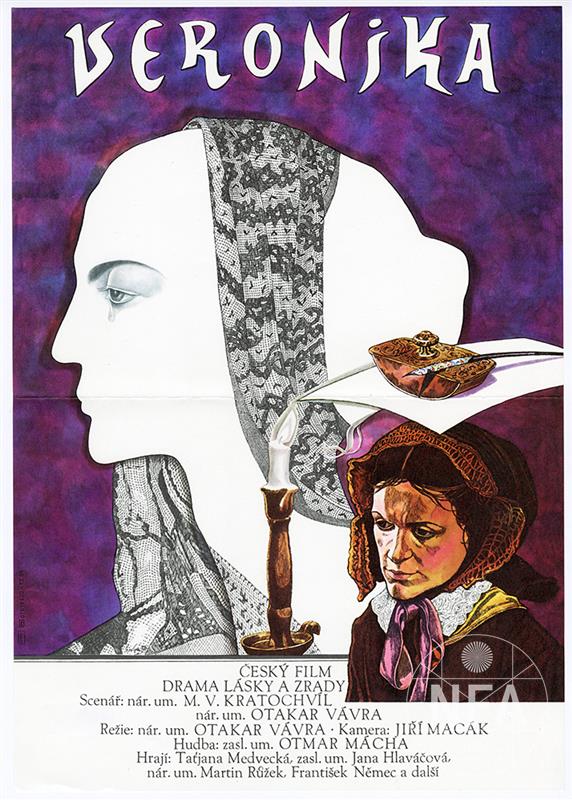Veronika
Country
CzechoslovakiaCopyright
1985Production year
1985Premiere
1 May 1986Runtime
97 minDirector
Otakar VávraCategory
filmGenre
historicalTypology
featuretheatrical distributionlongOriginal title
VeronikaCzech title
VeronikaEnglish title
VeronikaSummary
Otakar Vávra’s enthusiasm for historical dramas continued with this 1985 film, which also indirectly touches upon his abiding interest in 19th century Czech writer Božena Němcová (something which would fully manifest itself in the biographical film Horoucí srdce [An Ardent Heart, 1962]). The protagonist of this film would have been well-known to Němcová – Veronika Pavlitová is inspired by the figure of Viktoria Paulová, who was a close acquaintance of the author during 1855. The naive, highly active and patriotic writer longs to end her father’s imprisonment, and thus becomes an informant, bringing information to the secret police about Němcová and other Czech National Revival figures. The approach of death brings a heavy heart as she reflects on her deeds. This tragic drama was first related by author Miloš V. Kratochvíl, who also partook in adapting Vávra’s project for the big screen. Veronika has an unusual place within the director’s expansive filmography: it is free of any forced ideological statements, while it also unusually relates the lesbian tendencies of its lead character, and reflects the very contemporary issues of informers, self-censorship and those who publish for their own safety under a pseudonym.
Synopsis
It is a winter day of 1854 and Veronika Pavlitová waits for Emperor Franz Joseph I's procession for hours in order to throw a humble plea for the release of her father - a political prisoner - into the emperor's brougham. After the death of her mother, the girl tends to her four younger siblings in desperate conditions. She is arrested by the police but is released after providing an explanation. She falls severely ill and a patriotic physician Lambl restores her to health. He moreover introduces the literarily gifted Veronika to her idol - Boena Němcová, an excellent writer but also a personality who is rather inconsistently accepted by the society. This is also why Němcová is followed by the secret police. The police director Paümann makes use of the naive Veronika - he promises her some earnings as a home Czech teacher of his sons and even assures her about her father's release from prison. He then talks with the girl in a seemingly friendly way and the girl also mentions the people visiting Němcová and what they discuss. She betrays the pseudonyms under which the banned Bohemian journalists publish their articles. When Veronika realizes what she has done, it is too late. Paümann blackmails her, eventually forcing her to become an informer. Němcová is left by her lover Jurenka and her marrital crisis is completed. The unhappy woman begins writing her most famous novel, The Grandmother - a book of lyrical memories of her childhood. Veronika falls fatally ill with tuberculosis and her qualms seriously deteriorate her condition. Lambl's sister takes Pavlita's children to her village. Veronika dies even before managing to confess her betrayal to Němcová.
Note
The title character of Veronika Pavlitová was written on the basis of a real person, Viktorie Paulová (1834–1856).
Cast
Taťjana Medvecká
Veronika Pavlitová
Jana Hlaváčová
spisovatelka Božena Němcová
Martin Růžek
dvorní rada baron Anton von Paümann, policejní ředitel
František Němec
MUDr. Dušan Lambl
Jiří Adamíra
páter Václav Štulc
Viktor Preiss
Josef Václav Frič
Oldřich Vízner
spisovatel Václav Čeněk Bendl
Jiří Bartoška
medik Hanuš Jurenka
Radovan Lukavský
respicient Josef Němec, muž Němcové
Alena Procházková
služka Marie
Růžena Merunková
Lamblova sestra
Jan Přeučil
policejní komisař Friedrich Nečásek
Jaroslav Radimecký
profesor Jan Evangelista Purkyně
Svatava Hubeňáková
Jurenkova matka
Eliška Sirová
Kateřina, sestra Veroniky
Dana Morávková
Dora, dcera Němcové
Drahoslava Landsmanová
Paümannova žena
Vladimír Bičík
policejní agent
Antonín Brtoun
policejní agent
Milan Sandhaus
mistr sazeč
Ludmila Roubíková
domovnice Brousková
Jana Vychodilová
hospodyně u Purkyněho
Eva Řepíková
hospodyně u Štulce
Vladimír Salač
policejní písař
Libuše Šedivá
Anička
Petr Patera
Spitzer
Jiří Strach
Jaroslav, syn Němcové
Jakub Bufka
Robert, Paümannův syn
Jan Vedral
Ernest, Paümannův syn
Růžena Lysenková
Jurenkova bytná
Gaston Šubert
muž s hodinkami
Martina Horáčková
komorná
David Ostrýt
Bořivoj, bratr Veroniky
Zbyněk Vítů
Svatopluk, bratr Veroniky
Jiří Hein
muž ve Stromovce
Tomáš Hendrych
císař František Josef I.
Dubbing
Oto Ševčík
hlas velitele strážního oddílu ve Stromovce
Crew and creators
Director
Second Unit Director
Milan Kadlec, Petr Makovička
Continuity
Based on
Miloš V. Kratochvíl (Veronika – novela)
Screenplay
Shooting Script
Dramaturg
Director of Photography
Second Unit Photography
Camera Operator
Production Designer
Assistent Production Designer
Set Designer
Milan Bábik, Jiří Matějka, Eva Slívová, Milan Tahotný
Costume Designer
Costumes
Make-Up Artist
Film Editor
Assistant Film Editor
Sound Designer
Stunts
Production Manager
Unit Production Manager
Lev Veltrubský, Jana Hauserová, Helena Landovská
Consultant
prof. dr. Otakar Matoušek (historie), prof. Karel Cvejn (historie), PhDr. Jan Dvořák (kulturně-historický poradce), RSDr. Pavel Auersperg, CSc. (ideový poradce)
Cooperation
Ivana Vlčková (klapka), Jiří Novák (vrchní osvětlovač), Karel Ješátko (fotograf), J. Dvořák
Music
Music Composed by
Music Performed by
Havlákovo kvarteto (Music Conducted by Lubomír Havlák), FISYO (Music Conducted by Mario Klemens)
Songs
Na Berounce pod Tetínem
Song Composer Josef Vorel
Production info
Original Title
Veronika
Czech Title
Veronika
English Title
Veronika
Category
film
Typology
featuretheatrical distribution
Genre
historical
Origin country
Czechoslovakia
Copyright
1985
Production Year
1985
Production specifications
literary Screenplay approved 26 July 1984
technical Screenplay approved 1 February 1985
start of filming 29 March 1985
end of filming 19 September 1985
projection approval 28 September 1985
withdrawal from distribution 30 June 1991
Premiere
premiere 1 May 1986 /suitable for youths/
Production
Copyright Holders
Laboratories
Distribution
Creative Group
1. dramaturgicko-výrobní skupina, Jiří Blažek (vedoucí 1. dramaturgicko-výrobní skupiny)
Technical info
Duration typology
feature film
Duration in minutes
97 min
Original length in metres
2 766 meters
Distribution carrier
16mm, 35mm
Aspect ratio
1:1,37
Colour
colour
Sound
sound
Sound system/format
mono
Versions
Czech
Dialogue languages
Czech
Subtitles languages
without subtitles
Intertitles languages
Czech
Opening/End credits languages
Czech
Awards
Vítěz
Festival: 24. festival českých a slovenských filmů Mariánské Lázně
1986
Mariánské Lázně / Czechoslovakia
Taťjana Medvecká




